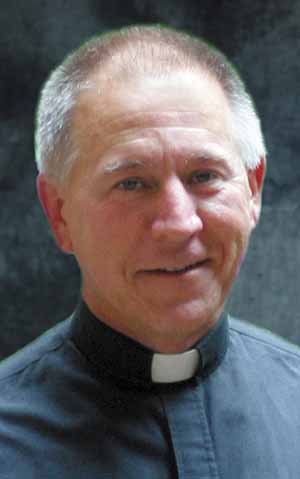By Fr. Bud Grant

Recently I received this terse e-mail from a student: “who is Chardin?” Well, Chardin was a Jesuit paleontologist who wove a breathtakingly mystical yet sublimely rational vision of how all of the earth’s undulating epochs of life and death form the evolving self-expression of the “Cosmic Christ” to be fulfilled in the eschatological “Omega Point.”
Chardin’s admittedly problematic poetic science has suffered waves of popularity and dismissal, but his urge to intertwine rational explorations of the natural world with suprarational faith remains potent. The harmony that ought to exist between the sciences and faith has always been fragile. One of its very earliest proponents was Ambrose of Milan who, in his “Hexameron,” says: “The world is an example of the workings of God because, while we observe the work, the Worker is brought before us … and work is a distinctive mark of divine majesty from which the wisdom of God is made manifest.”
Timid religious fear of intellectual inquiry into nature is a sign, not of faith, but of mere ideology. Any appearance of a contradiction between faith and reason simply requires that we retrace our steps to discover the root of our error. After all, Christian intellectuals once argued that the world was created on Oct. 23, 4004 B.C.E. The conviction that reason cannot threaten genuine faith finds champions in every age, from Boethius to Aquinas to Chardin to, most recently, Dr. John Haught, of the Woodstock Theological Center.
Still, the on-again off-again romance between faith and reason is as fragile today as it was when Darwin first published “On the Origin of Species” in 1859. Creationists still force a literalist reading of Genesis. “Scientific Materialists,” to use Haught’s phrase, including Richard Dawkins, Christopher Hitchens, Stephen Jay Gould, and especially Daniel Dennett, use evolutionary science as a bludgeon to hammer at faith. Dennett’s “Darwin’s Dangerous Idea,” in particular, is a formidable intellectual assault. The crux of his argument is theodicy: why does a loving God allow the earth to evolve through millennia, creating and then sweeping away countless species and whole ecosystems in order to finally arrive at homo sapiens? Haught replies in “God After Darwin:” “Darwin has gifted us with an account of life whose depth, beauty, and pathos — when seen in the context of the larger cosmic epic of evolution — expose us afresh to a raw reality of the sacred and to a resoundingly meaningful universe.” Science is an impetus to a deeper and broader theological reflection.
“Evolutionary theology,” he says, “seeks to show how our new awareness of cosmic and biological evolution can enhance and enrich traditional teachings about God and God’s way of acting in the world.” For him, this consists of a “hope for a final future fulfillment” in which “the universe is … still emerging into being … that has never yet been actualized but that we may hope will come into being in the future, not just our own future, but also that of the entire universe.”
It must be said that Haught’s peculiarly eschatological hope is problematic for environmental sustainability. In “The Promise of Nature,” he evokes a “vision of nature as promise” which means that the “universe is an adventurous journey toward the complexity and beauty of a future perfection.” Nature’s value “consists not so much of its sacramentally mediating a divine presence, as of its nurturing a promise of future perfection.” This teleological outlook, like Chardin’s, is too optimistic. It cries for an ethical warning against development hubris that encourages us to simplify, commodify, use — and dispose of nature, unless we take such human initiatives to be part of evolution.
Still, Haught’s contribution is that environmental theologians ought to probe deeply into the science of God’s creation with the absolute best use of our reason, not to dispel mystery, but to elucidate it; not to worship the Earth, but to admire it; not to be threatened by what we might find, but to wallow in it.
(Father Bud Grant is a professor of theology at St. Ambrose University in Davenport.)







